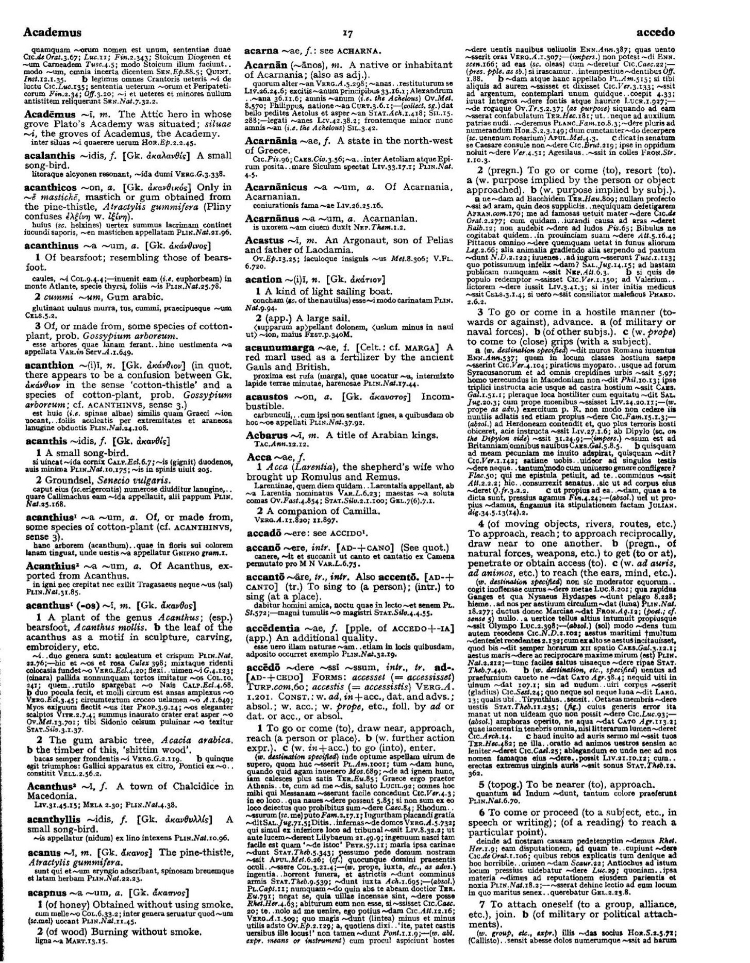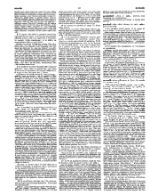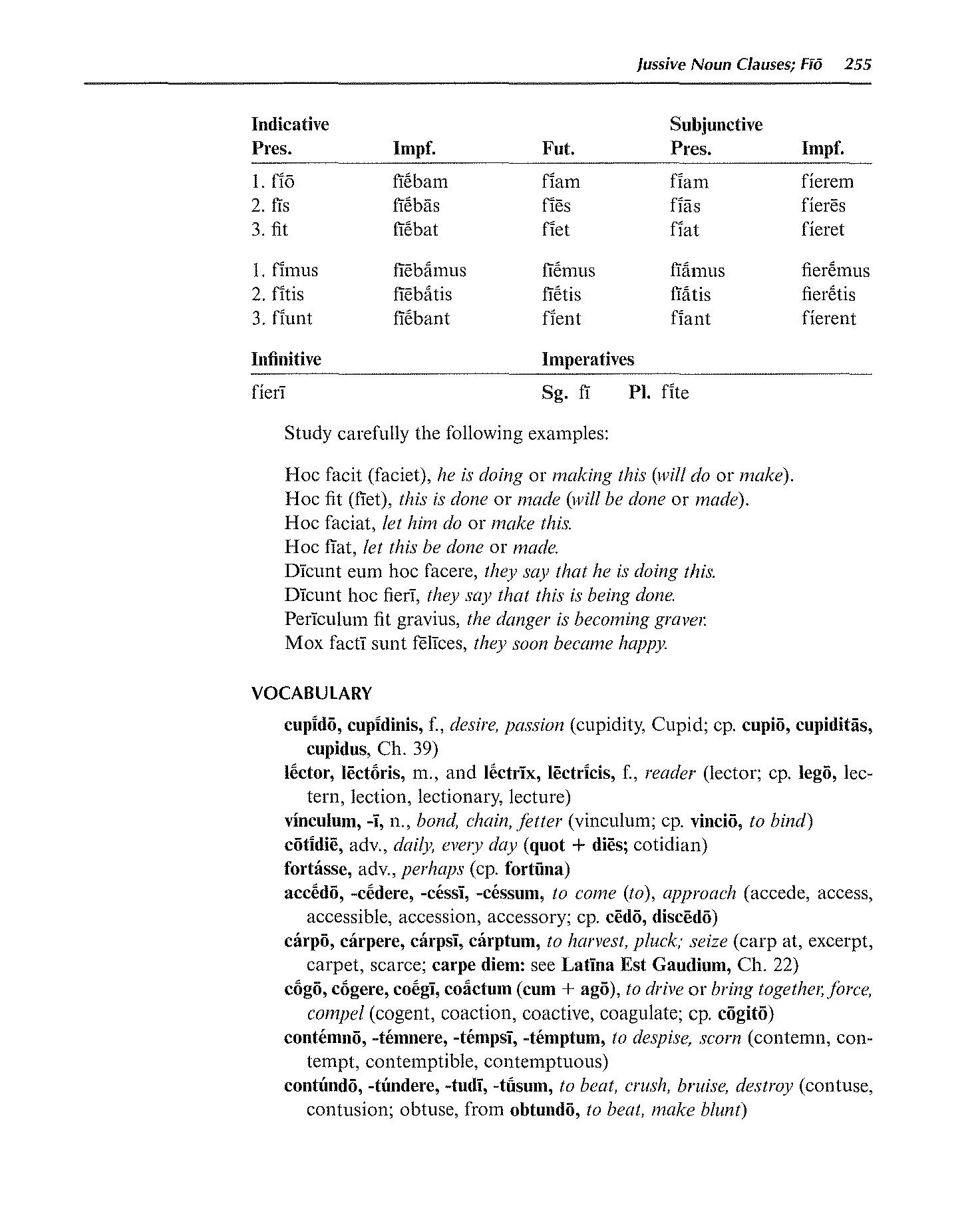
page_listing.tpl
page_subListingDetails.tpl
sub_listingDetails_style1.tpl
sub_listingDetails.title.tpl
accēdere to approach
accēdere is a Latin Verb that primarily means to approach.
Definitions for accēdere
Wheelock's Latin
Verb
- 1
to come (to), approach
English derivatives:
accede access accessible accession accessory
Oxford Latin Dictionary
Verb
- 1
To go or come (to), draw near, approach, reach (a person or place). (b) (w. further action expr.). (c) (w. in.+acc.) to go (into), enter.
- 2
(pregn.) To go or come (to), resort (to). (a) (w. purpose implied by the person or object approached). (b) (w. purpose implied by subj.).
- 3
To go or come in a hostile manner (towards or against), advance. (a) (military or naval forces). (b) (of other subjs.). (c) (w. prope) to come to (close) grips (with a subject).
- 4
(of moving objects, rivers, routes, etc.) To approach, reach; to approach reciprocally, draw near to one another. (b) (pregn., of natural forces, weapons, etc.) to get (to or at), penetrate or obtain access (to). (c) (w. ad auris, ad animos. etc.) to reach (the ears, mind, etc.).
- 5
(topog.) To be nearer (to), approach.
Sentences with accēdere
Latin to English
Nec pietas ullast velatum saepe videri vertier ad lapidem atque omnis accedere ad aras nec procumbere humi prostratum et pandere palmas ante deum delubra nec aras sanguine multo spargere quanrupedum nec votis nectere vota, sed mage pacata posse omnia mente fueri.Compare It is no piety to show oneself often with covered head, turning toward a stone and approaching every altar, none to fall prostrate upon the ground and to spread open the palms before shrines of the gods, none to sprinkle altars with the blood of beasts in showers and to link vow to vow; but rather to be able to survey all things with mind at peace.
Iuvat integros accedere fontis atque haurire, iuvatque novos decerpere flores insignemque meo capiti petere inde coronam unde prius nulli velarint tempora musae; primum quod magnis doceo de rebus et artis religionum animum nodis exsolvere pergo, deinde quod obscura de re tam lucida pango carmina, musaeo contingens cuncta lepore.Compare I love to approach virgin springs and there to drink: I love to pluck fresh flowers, and to seek an illustrious chaplet for my head from fields whence ere this the Muses have crowned the brows of none; first because my teaching is of high matters, and I proceed to unloose the mind from the close knots of religion; next because the subject is so dark and the lines I write so clear, as I touch all with the Muses's grace.
Conjugation table for accēdere
Cactus2000
| ACTIVE | |
| Indicative present | Indicative imperfect |
| accēdō accēdis accēdit accēdimus accēditis accēdunt | accēdēbam accēdēbās accēdēbat accēdēbāmus accēdēbātis accēdēbant |
| Indicative perfect | Indicative pluperfect |
| accessī accessistī accessit accessimus accessistis accessērunt / accessēre | accesseram accesserās accesserat accesserāmus accesserātis accesserant |
| Indicative future | Indicative future perfect |
| accēdam accēdēs accēdet accēdēmus accēdētis accēdent | accesserō accesseris accesserit accesserimus accesseritis accesserint |
| Subjunctive present | Subjunctive imperfect |
| accēdam accēdās accēdat accēdāmus accēdātis accēdant | accēderem accēderēs accēderet accēderēmus accēderētis accēderent |
| Subjunctive perfect | Subjunctive pluperfect |
| accesserim accesseris accesserit accesserimus accesseritis accesserint | accessissem accessissēs accessisset accessissēmus accessissētis accessissent |
Infinitive present accēdere Infinitive perfect accessisse Infinitive future accessūrum esse | Imperative present accēde accēdite Imperative future accēditō accēditō accēditōte accēduntō |
| PASSIVE | |
| Indicative present | Indicative imperfect |
| accēdor accēderis accēditur accēdimur accēdiminī accēduntur | accēdēbar accēdēbāris / accēdēbāre accēdēbātur accēdēbāmur accēdēbāminī accēdēbantur |
| Indicative perfect | Indicative pluperfect |
| accessus sum accessus es accessus est accessī sumus accessī estis accessī sunt | accessus eram accessus erās accessus erat accessī erāmus accessī erātis accessī erant |
| Indicative future | Indicative future perfect |
| accēdar accēdēris / accēdēre accēdētur accēdēmur accēdēminī accēdentur | accessus erō accessus eris accessus erit accessī erimus accessī eritis accessī erunt |
| Subjunctive present | Subjunctive imperfect |
| accēdar accēdāris / accēdāre accēdātur accēdāmur accēdāminī accēdantur | accēderer accēderēris / accēderēre accēderētur accēderēmur accēderēminī accēderentur |
| Subjunctive perfect | Subjunctive pluperfect |
| accessus sim accessus sīs accessus sit accessī sīmus accessī sītis accessī sint | accessus essem accessus essēs accessus esset accessī essēmus accessī essētis accessī essent |
Infinitive present accēdī Infinitive perfect accessum esse Infinitive future accessum īrī | Imperative present accēdere accēdiminī Imperative future accēditor accēditor - accēduntor |
| PARTICIPLE | ||
| Participle present active | ||
| Nom. | accēdēns | accēdentēs |
| Gen. | accēdentis | accēdentium |
| Dat. | accēdentī | accēdentibus |
| Acc. | accēdentem | accēdentēs |
| Abl. | accēdente | accēdentibus |
| Participle future active | ||
| Nom. | accessūrus | accessūrī |
| Gen. | accessūrī | accessūrōrum |
| Dat. | accessūrō | accessūrīs |
| Acc. | accessūrum | accessūrōs |
| Abl. | accessūrō | accessūrīs |
| Participle perfect passive | ||
| Nom. | accessus | accessī |
| Gen. | accessī | accessōrum |
| Dat. | accessō | accessīs |
| Acc. | accessum | accessōs |
| Abl. | accessō | accessīs |
| Gerundive | ||
| Nom. | accēdendus | accēdendī |
| Gen. | accēdendī | accēdendōrum |
| Dat. | accēdendō | accēdendīs |
| Acc. | accēdendum | accēdendōs |
| Abl. | accēdendō | accēdendīs |
| Gerund | Supine | |
| Nom. | accēdere | accessum |
| Gen. | accēdendī | accessū |
| Dat. | accēdendō | |
| Acc. | accēdendum | |
| Abl. | accēdendō | |
Data sources
Notes
- Definitions
- Frederick M. Wheelock, Wheelock's Latin, 6th ed., rev. Richard A. LaFleur (New York, NY: HarperCollins Publishers, 2005): 255.
- P. G. W. Glare, Oxford Latin Dictionary, Vols. 1-8 (Oxford: Clarendon Press, 1982): 17.
- Word frequencies
- Christopher Francese, "Latin Core Vocabulary," Dickinson College Commentaries, last modified 2014, http://dcc.dickinson.edu.
- Paul B. Diederich, The Frequency of Latin Words and Their Endings, PhD diss., (Columbia University, 1939).
- Louis Delatte, Suzanne Govaerts, Joseph Denooz, and Etienne Evrard, Dictionnaire fréquentiel et index inverse de la langue latine [Frequency Dictionary and Inverse Index of the Latin Language] (Liège, Belgium: Laboratoire d'analyse statistique des langues anciennes de l'Université de Liège [L.A.S.L.A.], 1981): 122.
Bibliography
Allen, Joseph H. Allen and Greenough's New Latin Grammar for Schools and Colleges: Founded on Comparative Grammar. Edited by James B. Greenough, George L. Kittredge, Albert A. Howard, and Benjamin L. D'Ooge. Boston, MA: Ginn & Company, 1903.
Crystal, David. A Dictionary of Linguistics and Phonetics. 6th ed. Oxford, UK: Blackwell Publishing, 2008.
Delatte, Louis, Suzanne Govaerts, Joseph Denooz, and Etienne Evrard. Dictionnaire fréquentiel et index inverse de la langue latine [Frequency Dictionary and Inverse Index of the Latin Language]. Liège, Belgium: Laboratoire d'analyse statistique des langues anciennes de l'Université de Liège (L.A.S.L.A.), 1981.
Diederich, Paul B. The Frequency of Latin Words and Their Endings. PhD diss., Columbia University, 1939.
Francese, Christopher. "Latin Core Vocabulary." Dickinson College Commentaries. Last modified 2014. http://dcc.dickinson.edu/latin-vocabulary-list.
Gildersleeve, Basil L., and Gonzales Lodge. Gildersleeve's Latin Grammar: Third Edition, Revised, and Enlarged. 3rd ed. London, England: Macmillan and Co., 1903.
Glare, Peter G.W. Oxford Latin Dictionary. Vols. 1-8. Oxford, England: Clarendon Press, 1982.
Krüger, Bernd. "Latin Conjugation Tables." Cactus2000. Accessed May 5, 2023. https://latin.cactus2000.de/index.en.php.
Pierson, Nick. "Sound of Text." Accessed October 26, 2019. https://soundoftext.com.
Wheelock, Frederick M. Wheelock's Latin. 6th ed. Revised by Richard A. LaFleur. New York, NY: HarperCollins Publishers, 2005.
Wiktionary Contributors. "Victionarium." Wikimedia Foundation, Inc. Updated March 18, 2019. https://la.wiktionary.org/wiki/Victionarium:Pagina_prima.
Citation
Chicago (17th ed.)
Allo Contributors. "accēdō, accēdere, accessī, accessum (v.) - Latin Word Definition." Allo Latin Dictionary. Last modified . Accessed February 19, 2026. http://ancientlanguages.org/latin/dictionary/accedo-accedere-accessi-accessum.
Entry created on . Last updated on .








